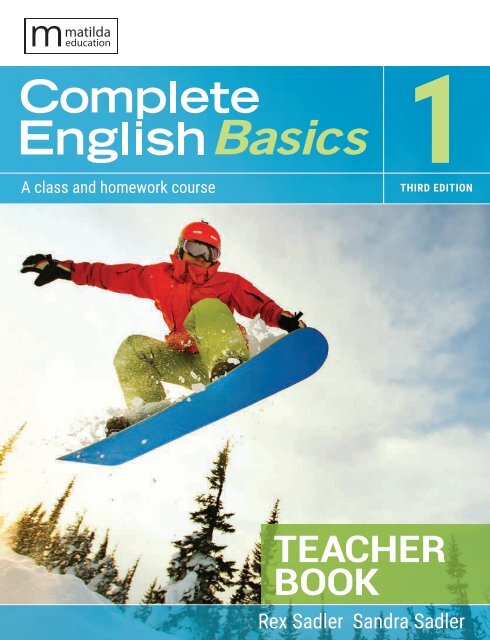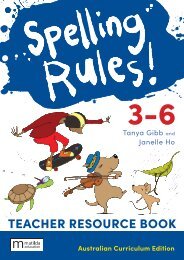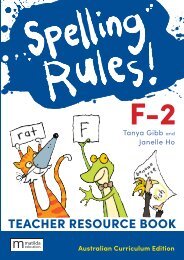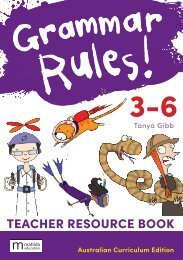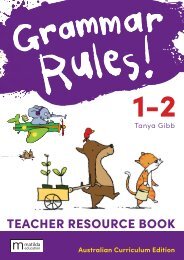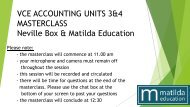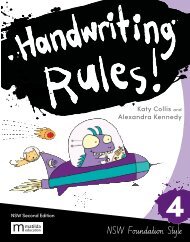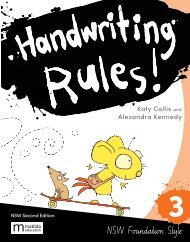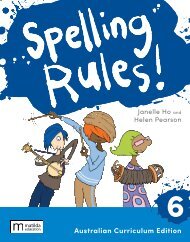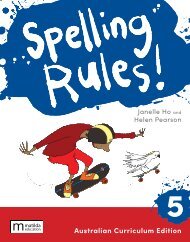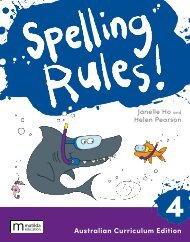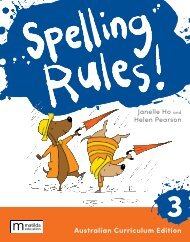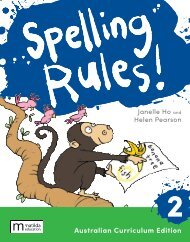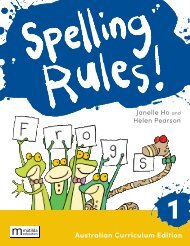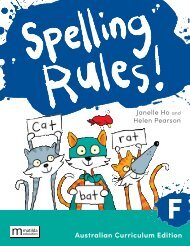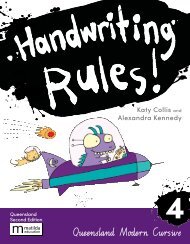Complete English Basics 1 Teacher Book
Complete English Basics is a workbook designed to support junior to middle secondary students with essential language and literacy skills. Highly structured units are organised into sections on comprehension, spelling and vocabulary, language, punctuation and writing, making the book ideal for both classwork and homework. Exercises are contextualised through high-interest topics that will fully engage students' attention. The book also features a wide variety of activity types and clear, concise explanations of grammar and punctuation rules with sequential development of language skills. This third edition includes additional content on writing, updated extracts and a new design. It also includes additional worksheets, plus answers, accessed via the digital download code in each Teacher Book in the categories: Literature, Spelling and Vocabulary, Language, and The Craft of Writing, mimicking the structure of the print books.
Complete English Basics is a workbook designed to support junior to middle secondary students with essential language and literacy skills. Highly structured units are organised into sections on comprehension, spelling and vocabulary, language, punctuation and writing, making the book ideal for both classwork and homework. Exercises are contextualised through high-interest topics that will fully engage students' attention. The book also features a wide variety of activity types and clear, concise explanations of grammar and punctuation rules with sequential development of language skills. This third edition includes additional content on writing, updated extracts and a new design. It also includes additional worksheets, plus answers, accessed via the digital download code in each Teacher Book in the categories: Literature, Spelling and Vocabulary, Language, and The Craft of Writing, mimicking the structure of the print books.
You also want an ePaper? Increase the reach of your titles
YUMPU automatically turns print PDFs into web optimized ePapers that Google loves.
1<br />
A class and homework course<br />
THIRD EDITION<br />
TEACHER<br />
BOOK<br />
Rex Sadler Sandra Sadler
1<br />
A class and homework course<br />
THIRD EDITION<br />
TEACHER<br />
BOOK<br />
Rex Sadler Sandra Sadler
This edition published in 2021 by<br />
Matilda Education Australia, an imprint<br />
of Meanwhile Education Pty Ltd<br />
Level 1/274 Brunswick St<br />
Fitzroy, Victoria Australia 3065<br />
T: 1300 277 235<br />
E: customersupport@matildaed.com.au<br />
www.matildaeducation.com.au<br />
First edition published in 2007 by Macmillan Science and Education Australia Pty Ltd<br />
Copyright © Rex Sadler and Sandra Sadler 2007, 2010, 2017<br />
The moral rights of the author have been asserted.<br />
All rights reserved.<br />
Except under the conditions described in the<br />
Copyright Act 1968 of Australia (the Act) and subsequent amendments,<br />
no part of this publication may be reproduced,<br />
stored in a retrieval system, or transmitted in any form or by any means,<br />
electronic, mechanical, photocopying, recording or otherwise,<br />
without the prior written permission of the copyright owner.<br />
Educational institutions copying any part of this book<br />
for educational purposes under the Act must be covered by a<br />
Copyright Agency Limited (CAL) licence for educational institutions<br />
and must have given a remuneration notice to CAL.<br />
Licence restrictions must be adhered to. For details of the CAL licence, contact:<br />
Copyright Agency Limited, Level 11, 66 Goulburn Street, Sydney, NSW 2000.<br />
Telephone: (02) 9394 7600. Facsimile: (02) 9394 7601. Email: memberservices@copyright.com.au<br />
Publication data<br />
Authors: Rex Sadler and Sandra Sadler<br />
Title: <strong>Complete</strong> <strong>English</strong> <strong>Basics</strong> 1 <strong>Teacher</strong> <strong>Book</strong>: A Class and Homework Course<br />
ISBN: 978 1 4202 3712 2<br />
Publisher: Emma Cooper<br />
Project editor: Barbara Delissen<br />
Cover and text designer: Dimitrios Frangoulis<br />
Production control: Janine Biderman<br />
Photo research and permissions clearance: Vanessa Roberts<br />
Typeset in Heuristica Regular 10.5/12pt by Dim Frangoulis<br />
Cover image: Shutterstock/Ipatov<br />
Printed in by <br />
1 2 3 4 5 6 7 25 24 23 22 21 20<br />
Warning: It is recommended that Aboriginal and Torres Strait Islander peoples exercise caution<br />
when viewing this publication as it may contain images of deceased persons.
Contents<br />
Preface<br />
Acknowledgements<br />
vii<br />
viii<br />
1 Enjoying texts 1<br />
Comprehension Film review 1<br />
Poem 3<br />
Information report 4<br />
Spelling and vocabulary Texts 6<br />
Language Sentences 7<br />
Phrases 9<br />
Punctuation Why do we use punctuation marks? 10<br />
The craft of writing Becoming a better writer 11<br />
2 Ancient times 12<br />
Comprehension Gladiators 12<br />
Spelling and vocabulary Ancient worlds 14<br />
Language Nouns 15<br />
Punctuation Starting and finishing sentences 17<br />
The craft of writing People from other times 18<br />
3 Around the world 19<br />
Comprehension Expedition to the jungles of Borneo 19<br />
Spelling and vocabulary Getaway 21<br />
Language Common and proper nouns 22<br />
Punctuation Making sense with sentences 24<br />
The craft of writing Life experiences 25<br />
4 People26<br />
Comprehension Mrs Pratchett 26<br />
Spelling and vocabulary Occupations 28<br />
Language Nouns—gender 29<br />
Punctuation Capital letters and full stops 30<br />
The craft of writing People 32<br />
5 Climb every mountain 33<br />
Comprehension Cliffhanger 33<br />
Spelling and vocabulary On the mountain 35<br />
Language Collective nouns 37<br />
Punctuation Statements and questions 38<br />
The craft of writing Overcoming adversity 39<br />
978 1 4202 3712 2<br />
iii
iv Contents<br />
978 1 4202 3712 2<br />
6 Feelings and emotions 40<br />
Comprehension What it feels like to survive a volcanic eruption 40<br />
Spelling and vocabulary That’s life! 42<br />
Language Abstract nouns 43<br />
Punctuation Types of sentences 44<br />
The craft of writing What it feels like to … 46<br />
7 Drive47<br />
Comprehension Car accident 47<br />
Spelling and vocabulary On the road 49<br />
Language Revision—nouns 51<br />
Punctuation Using capital letters for proper nouns 52<br />
The craft of writing An accident 53<br />
8 Marooned!54<br />
Comprehension The blue dolphins 54<br />
Spelling and vocabulary Survival 56<br />
Language Synonyms 58<br />
Punctuation Commas 59<br />
The craft of writing Castaway 60<br />
9 Food, glorious food! 61<br />
Comprehension The pizza 61<br />
Spelling and vocabulary Food, food, food! 63<br />
Language Antonyms 64<br />
Punctuation Apostrophes—abbreviating words 65<br />
The craft of writing Food, glorious food 67<br />
10 Cities68<br />
Comprehension A city under siege 68<br />
Spelling and vocabulary Cityscape 70<br />
Language Homonyms 71<br />
Punctuation Apostrophes—avoiding confusion 73<br />
The craft of writing Cities, towns and other places 74<br />
11 Fantasy75<br />
Comprehension The Grand High Witch 75<br />
Spelling and vocabulary The world of fantasy 77<br />
Language Adjectives 79<br />
Punctuation Apostrophes—ownership 80<br />
The craft of writing Villains 81<br />
12 Alien worlds 82<br />
Comprehension The Tripod 82<br />
Spelling and vocabulary Space mission 84<br />
Language Verbs 85<br />
Punctuation Capital letters 86<br />
The craft of writing The time machine 88
978 1 4202 3712 2 Contents<br />
v<br />
13 The animal kingdom 89<br />
Comprehension Skunks 89<br />
Spelling and vocabulary Creatures great and small 91<br />
Language Idioms 92<br />
Punctuation Uses of the comma 94<br />
The craft of writing Animal experiences 95<br />
14 Fashion96<br />
Comprehension Jeans 96<br />
Spelling and vocabulary Glitz and glamour 98<br />
Language Adverbs 100<br />
Punctuation Abbreviations 101<br />
The craft of writing Clothes and fashions 102<br />
15 Speaking personally 103<br />
Comprehension Chased by a boar 103<br />
Spelling and vocabulary Describing people 105<br />
Language Word families 107<br />
Punctuation Paragraphs 108<br />
The craft of writing Eyewitness accounts 109<br />
16 The long arm of the law 110<br />
Comprehension The worst bank robbers 110<br />
The noisiest burglar 111<br />
Spelling and vocabulary Law and order 112<br />
Language Prefixes 113<br />
Punctuation Quotation marks for speech 115<br />
The craft of writing A crime scene 116<br />
17 The world of computers 117<br />
Comprehension Space demons 117<br />
Spelling and vocabulary Computers 119<br />
Language Suffixes 120<br />
Punctuation More about quotation marks 121<br />
The craft of writing Inventions 123<br />
18 House and home 124<br />
Comprehension Bilbo Baggins’s house and home 124<br />
Spelling and vocabulary Home, sweet home 126<br />
Language Making comparisons using similes 127<br />
Punctuation Direct and indirect speech 129<br />
The craft of writing Houses and homes 130<br />
19 Wildfire131<br />
Comprehension Firestorm 131<br />
Spelling and vocabulary Fire 133<br />
Language Making comparisons—similes and metaphors 134<br />
Punctuation Using quotation marks for titles 136<br />
The craft of writing Disaster 137
vi Contents<br />
978 1 4202 3712 2<br />
20 Family and friends 138<br />
Comprehension A friend in need 138<br />
Spelling and vocabulary Family and friends 140<br />
Language Using better words 141<br />
Punctuation Punctuating lists 143<br />
The craft of writing Family and friends 144<br />
21 Sun, surf and sand 145<br />
Comprehension A shark tried to eat me 145<br />
Spelling and vocabulary The beach 147<br />
Language Shades of meaning 148<br />
Punctuation Revision—punctuating sentences 149<br />
The craft of writing The sea 150<br />
22 Just in time 151<br />
Comprehension The land that time forgot 151<br />
Spelling and vocabulary Words in time 153<br />
Language Prefixes and suffixes 154<br />
Punctuation Revision—sentences 155<br />
The craft of writing Long, long ago 156<br />
Back-of-the-book dictionary 157<br />
<strong>Teacher</strong>s will find extra activities, ‘Fun with words’, online.
Preface<br />
<strong>Complete</strong> <strong>English</strong> <strong>Basics</strong> 1 sets out to present essential <strong>English</strong> skills in an interesting and<br />
meaningful way for junior secondary students.<br />
This third edition covers essential language and literacy skills underpinning the Australian<br />
Curriculum. It incorporates a wide range of comprehension texts, spelling and vocabulary<br />
development, as well as language work on sentences, phrases, parts of speech, word families<br />
and paragraphing. It is important to note that 22 creative writing tasks—linked to the ideas and<br />
techniques contained in the Literature section—have now been added.<br />
The workbook can be used as a class or homework text. One approach would be to have<br />
students complete each unit over a two-week period.<br />
The stimulus materials and exercises are designed to improve comprehension and<br />
vocabulary skills as well as language usage and spelling. A special feature is the back-of-the-book<br />
dictionary, which encourages students to expand their vocabulary by looking up the meanings of<br />
unfamiliar words.<br />
Correct spelling is essential for good communication. Research has shown that in those<br />
classrooms where teachers are concerned about correct spelling and vocabulary enrichment,<br />
the students’ spelling level improves significantly. It is a good idea, if time allows, to have a brief<br />
spelling test at the end of each unit using the words from the spelling and vocabulary list.<br />
The extracts are engaging and cover a diverse range of topics—from shark attacks to<br />
gladiators. A range of genres is represented, including biography, crime, fiction and adventure.<br />
Above all, we hope that students will enjoy their <strong>English</strong> studies as they gain basic <strong>English</strong><br />
skills.<br />
Rex and Sandra Sadler<br />
978 1 4202 3712 2<br />
vii
Acknowledgements<br />
The author and publisher are grateful to the following for permission to reproduce copyright material:<br />
Photographs<br />
Alamy/A.F. ARCHIVE, 60, 102, /cbstockfoto, 4, /Pictorial Press,<br />
116; Getty Images, 56, /Jetta Productions, 3, /Popperfoto,<br />
109; iStockphoto.com/AlexRaths, 32, /Joel Carillet, 39, /<br />
CoreyFord, 156, /Derek Dammann, 19, /DarthArt, 133, /<br />
demaerre, 119, /Jacques van Dinteren, 54, /Emilie Duchesne,<br />
67, /duncan1890, 74, /marta maria fontana, 96, /Georgijevic,<br />
70, /Global_Pics, 145, /Karim Hesham, 14, /Imgorthand, 18,<br />
/Kenishirotie, 123, /Iryna Kurhan, 75, /Catherine Lane, 98,<br />
/Tina Lorien, 68, /Franklin Lugenbeel, 47, /Lysogor, 137, /<br />
mandygodbehear, 82, /Mike Morley, 138, /Karen Mower, 53,<br />
/Barış Muratoğlu, 153, /OJO_Images, 140, /Onfokus, 112, /<br />
photocritical, 117, /RapidEye, 26, / John Sommer, 42, / Dieter<br />
Spears, 84, / tirc83, 110, /Rex_Wholster, 77, /XiXinXing, 126;<br />
THE KOBAL COLLECTION/DREAMWORKS/UNIVERSAL/<br />
BUITENDIJK, JAAP, 12; Shutterstock/ Algol, 88, /Big Pants<br />
Production, 89, // DM7, 151, /Alex Hinds, 15, /Brent Hofacker,<br />
61, / JAZZDOG, 124, /K Jensen, 25, /Iakov Kalinin, 21, 147, /<br />
Elena Kalistratova, 40, /Kencana Studio, 49, /Longjourneys,<br />
46, /Lucky Business, 63, /mervas, 11, /NarongchaiHlaw, 105, /<br />
Sean Pavone, 130, 131, /Dasha Petrenko, 95, /Pressmaster, 28,<br />
/sivanadar, 91, /Vixit, 33, 35.<br />
Other material<br />
Extract from The Zoo Expeditions by David Attenborough,<br />
Penguin UK, p191, © David Attenborough Productions<br />
Ltd 1980, reproduced with permission of The Lutterworth<br />
Press, 20; Account of Titanic sinking by George Brayton, 109;<br />
Excerpt from Adrift by Steve Callahan. Copyright © 1986<br />
by Steven Callahan. Reprinted by permission of Houghton<br />
Mifflin Harcourt Publishing Company. All rights reserved, 150;<br />
Extract from The Boy Who Was Afraid by Armstrong Sperry,<br />
Heinemann Educational Publishers, 1969, 8; Cover of Adrift<br />
by Steve Callahan. Copyright © 1986 by Steven Callahan.<br />
Reprinted by permission of Houghton Mifflin Harcourt<br />
Publishing Company. All rights reserved, 150; Extract from<br />
Firestorm! by Roger Vaughan Carr, Thomas Nelson Australia,<br />
reproduced with permission by Penguin Group (Australia)<br />
and Roger Vaughan Carr, 131–2; Extract from The Witches<br />
by Roald Dahl, Jonathan Cape Ltd. & Penguin <strong>Book</strong>s Ltd, ©<br />
Roald Dahl, reproduced with permission of David Higham<br />
Associates, 75-6; Extract from Boy by Roald Dahl, Puffin <strong>Book</strong>s,<br />
UK, © Roald Dahl 1984, reproduced with permission of David<br />
Higham Associates, 26; 47–8; Extract from The Story Makers:<br />
A collection of interviews with Australian and New Zealand<br />
Authors and Illustrators for Young People, edited by Margaret<br />
Dunkle. Oxford University Press, 1987, 11; Extract and cover<br />
from A Fortunate Life by AB Facey, Puffin, 1985, Reproduced<br />
with permission by Penguin Group (Australia), 103–4; Extract<br />
from Fear No Boundary by Lincoln Hall and Sue Fear, Hachette<br />
Australia, 2005, 33; Extract from Collision Course by Nigel<br />
Hinton, Oxford University Press, 1976, 53; Extract from Boy<br />
Overboard by Morris Gleitzman, Puffin, 2002, 39; Extract from<br />
The Rocks of Honey by Patricia Wrightson, Puffin, 1960, 8;<br />
Extract from What it feels like ... by AJ Jacobs, HarperCollins,<br />
UK, © Esquire Magazine (US) 2003, reprinted by permission<br />
of HarperCollins Publishers Ltd, 40; Extract from I Can Jump<br />
Puddles by Alan Marshall, Longman Cheshire, 1955, reprinted<br />
by permission of Penguin Group Australia Ltd, 138–7; Extracts,<br />
The <strong>Book</strong> of Heroic Failures by Stephen Pile, © 1979 Stephen<br />
Pile. Reproduced by permission of the author c/o Rogers,<br />
Coleridge & White Ltd, 20 Powis Mews, London W11 1JN, 110,<br />
111; Extract from Zlata’s Diary: A Child’s Life in Sarajevo by<br />
Zlata Filipovic, translated by Christina Pribichevich-Zoric,<br />
Viking 1994, first published in France as ‘Le Journal de Zlata’<br />
by Fixot et editions Robert Laffont 1993, © Fixot et editions<br />
Robert Laffont 1993, reproduced by permission of Penguin<br />
<strong>Book</strong>s Ltd, 68–9; Extract from Space Demons by Gillian<br />
Rubenstein. © Gillian Rubenstein, 1986. First published by<br />
Omnibus <strong>Book</strong>s, a division of Scholastic Australia, 1986.<br />
Reproduced with permission of Scholastic Australia Pty<br />
Limited, 117–18; Extract from Cannery Row by John Steinbeck,<br />
Viking Press, 1945, 8; Extract from The Light beyond the Forest<br />
by Rosemary Sutcliff, The Bodley Head, 1979, 74; ‘How to<br />
Train Your Dragon 3D’ by Andrew L Urban, The Sun-Herald,<br />
23 March 2010 (Based on the original review published on<br />
www.urbancinefile.com.au, March 23, 2010), 1; Quote from<br />
Rosemary Sutcliff, 74; Extract from Blue Fin by Colin Thiele,<br />
HarperCollins, 1974, 7; Extract from February Dragon by Colin<br />
Thiele, HarperCollins 1965, 7; Extract from Blueback by Tim<br />
Winton, Pan Macmillan Australia, 1987, 46; <strong>Book</strong> cover of<br />
Lockie Leonard by Tim Winton, Penguin <strong>Book</strong>s Australia, 2007,<br />
144; Extract from Lockie Leonard Human Torpedo by Tim<br />
Winton, Jenny Darling and Associates, 144; Extract from Time<br />
and Tide by Tim Winton, 25.<br />
The author and publisher would like to acknowledge the<br />
following:<br />
‘Our new teacher’ by David Bateson, 3; Extract from The<br />
White Mountains by John Christopher, Penguin <strong>Book</strong>s Ltd,<br />
reproduced with permission of John Christopher, 82-3;<br />
Extract, ‘A shark tried to eat me’ by Brian Rodger in Shark<br />
Hunters by Ben Cropp, Rigby Ltd, 1964, 145. Extract from<br />
Island of the Blue Dolphins by Scott O’Dell, Copyright © 1960<br />
by Scott O’Dell, renewed 1988 by Scott O’Dell, reprinted with<br />
permission of McIntosh & Otis, Inc, 54–5; Extract from The<br />
Hobbit by JRR Tolkien, Harper Collins, 1937, 81, 124–5.<br />
While every care has been taken to trace and acknowledge<br />
copyright, the publisher tenders their apologies for any<br />
accidental infringement where copyright has proved<br />
untraceable. They would be pleased to come to a suitable<br />
arrangement with the rightful owner in each case.<br />
viii 978 1 4202 3712 2
Enjoying texts<br />
1<br />
Comprehension<br />
Read the following texts and answer the questions for each one.<br />
Film review<br />
How to Train Your Dragon 3D<br />
CRITICS RATING 8/10<br />
Rated PG<br />
WHAT if your dad was the strong, not-so-silent<br />
type, the leader of the Viking tribe, going about<br />
his daily business of slaying dragons ... and you<br />
were a spindly-legged weakling teenager?<br />
You’d probably feel like Hiccup (voiced by Jay<br />
Baruchel), a spindly-legged weakling teenager<br />
who doesn’t fit his family’s long line of dragon<br />
slayers in the land of Berk. It’s a constant source<br />
of shame for his father, Stoick (voiced by Gerard<br />
Butler), a big, burly Viking (with a big Scottish<br />
burr).<br />
But when Hiccup comes face to snout with<br />
one of the most feared of the dragons, he<br />
inadvertently discovers a more positive and<br />
powerful way of dealing with the Viking’s ‘dragon<br />
problem’ than using a sword or a sledgehammer<br />
and goes on to change the lives of his entire<br />
tribe—and that of the dragons. That’s the<br />
essential moral of the story, that problems can be<br />
solved without violence. Not a bad message. The<br />
film also covers the father–son relationship with<br />
an equally positive message.<br />
978 1 4202 3712 2<br />
Talk to the animals …<br />
Viking teenager Hiccup befriends<br />
Toothless the dragon<br />
Magnificent 3D animation brings this family<br />
movie to life. The screenplay is smart, funny and<br />
has something to say. But perhaps the target<br />
audience of 10- to 14-year-olds will be even more<br />
impressed with the spectacular flying sequences,<br />
with Hiccup riding bareback through the air—or<br />
the mass fly-past by a dozen different types of<br />
dragons.<br />
The production elements all contribute to the<br />
immersive experience of an adventure in which<br />
humour plays a key role and the main characters<br />
quickly become familiar and real.<br />
There is a hint of romance as Hiccup and the<br />
feisty Astrid (voiced by Ferrera) find common<br />
ground and the charmingly fearsome, felineinspired<br />
dragon, Toothless, makes an indelible<br />
impression.<br />
The screenplay is based on Cressida Cowell’s<br />
popular book, which could become as hot as a<br />
dragon’s breath.<br />
Andrew L Urban<br />
1
2 <strong>Complete</strong> <strong>English</strong> <strong>Basics</strong> 1<br />
978 1 4202 3712 2<br />
Reading for understanding<br />
1 How do you know from the first paragraph that the movie is a fantasy?<br />
The words ‘slaying dragons’ indicate the film belongs to the fantasy genre.<br />
2 What evidence can you find in the first paragraph to show that Hiccup is not a character<br />
you would expect to be the hero?<br />
Hiccup is described as ‘a spindly-legged weakling’.<br />
3 In what ways is Hiccup’s father different to him?<br />
Hiccup’s father is a big, burly Viking and a dragon slayer.<br />
4 Where do Hiccup and his father live?<br />
They live in the land of Berk.<br />
5 What is the essential moral of the story?<br />
The essential moral is that problems can be solved without violence.<br />
6 Give an example of an equally positive message in the film.<br />
The relationship between the father and son also gives a positive message.<br />
7 Who, according to the reviewer, is the target audience of the film?<br />
The target audience of the film is 10- to 14-year-olds.<br />
8 What flying sequences did the reviewer feel would be likely to impress younger viewers?<br />
The spectacular flying sequences with Hiccup riding bareback through the air and the mass<br />
fly-past by a dozen different types of dragons would be likely to impress younger viewers.<br />
9 Identify the reviewer’s simile that predicts an increase in popularity of the book on<br />
which the film is based.<br />
‘As hot as a dragon’s breath’ is the simile that predicts the book’s increasing popularity.<br />
10 Using the back-of-the-book dictionary, give the meaning of:<br />
a burr: rough or indistinct pronunciation<br />
b inadvertently: not intended or deliberate<br />
c fearsome: causing fear<br />
d feline: belonging or relating to the cat family<br />
e indelible: incapable of being rubbed out or removed<br />
10 marks
978 1 4202 3712 2<br />
1 Enjoying texts 3<br />
Poem<br />
Our new teacher<br />
This teacher has such scary teeth,<br />
they look just like a shark’s;<br />
His eyes gleam in the sunlight<br />
like a pair of purple sparks.<br />
His voice is just as booming<br />
as the roar from some big gun;<br />
He can imitate a thunderstorm<br />
for a gruesome bit of fun.<br />
And now Billy who was silly<br />
almost every other day<br />
Does his tables, writes his spellings,<br />
hides his comic book away.<br />
Every lesson lasts a lifetime ...<br />
with our noses to each page,<br />
We imagine bars on windows<br />
and the classroom seems a cage.<br />
So, please come back, Miss Fothergill:<br />
though you won’t believe it’s true,<br />
We all loved you as our teacher;<br />
we were oh, so fond of you!<br />
David Bateson<br />
Reading for understanding<br />
1 Who seems to be the narrator of this poem?<br />
The narrator seems to be a young school student.<br />
2 What does the simile ‘like a shark’s’ suggest about the new teacher’s teeth?<br />
The simile suggests that his teeth are large and sharp.<br />
3 Identify the simile that describes the gleaming of the new teacher’s eyes.<br />
The simile is ‘like a pair of purple sparks’.<br />
4 What is the sound of the new teacher’s voice similar to?<br />
His voice is similar to the roar of some big gun (or a thunderstorm).<br />
5 How has Billy’s behaviour changed?<br />
Billy now does his tables and spelling and hides his comic book.<br />
6 Explain the meaning of ‘with our noses to each page’.<br />
The students are working hard reading their books and writing.<br />
7 Why do you think the narrator says, ‘We imagine bars on windows’?<br />
The students feel they have lost their freedom and are in a prison.
4 <strong>Complete</strong> <strong>English</strong> <strong>Basics</strong> 1<br />
978 1 4202 3712 2<br />
8 What is the narrator’s plea in the final stanza?<br />
The narrator begs the previous teacher, Miss Fothergill, to come back.<br />
9 What contrast do you think there would be between Miss Fothergill and the new<br />
teacher?<br />
Miss Fothergill would have been kind and caring, whereas the new teacher is a strong<br />
disciplinarian.<br />
10 Write down words that rhyme with each of the following:<br />
a shark’s sparks<br />
b page cage<br />
c true you<br />
10 marks<br />
Information report<br />
The taipan—the world’s deadliest snake<br />
AUSTRALIA is home to two different types of<br />
taipan—the inland taipan and the coastal taipan.<br />
The inland taipan (Oxyuranus microlepidotus),<br />
which grows up to 2.5 m, produces the deadliest<br />
venom of any snake in the world, but luckily<br />
it only lives in the deserts of central eastern<br />
Australia, where few humans visit. No human<br />
deaths caused by the inland taipan have been<br />
recorded, because an effective antivenom has<br />
been produced.<br />
Inland taipans live in deep cracks in the soil<br />
to escape the extreme heat of summer. During<br />
summer their scales are a light straw colour to<br />
reflect the heat, whereas in winter their scales<br />
change to a dark brown in order to absorb the<br />
sun’s rays.<br />
The inland taipan’s favourite food is native<br />
rats. When the rats are plentiful, the population<br />
of the snakes rises dramatically—female taipans<br />
lay between 12 and 20 eggs in the soil or in<br />
abandoned animal burrows. In extremely dry<br />
years, however, the rat population decreases<br />
through starvation, so there is little food for the<br />
snakes and their death rate rises.<br />
The longest recorded coastal taipan was<br />
3.35 m. Coastal taipans (Oxyuranus scutellatus)<br />
live in northern Queensland and in the Northern<br />
Territory. They are often seen in sugar-growing<br />
areas and on grassy sand dunes. Their favourite<br />
foods are small, warm-blooded mammals such as<br />
rats, lizards, quolls and bandicoots.<br />
Coastal taipans are very aggressive and<br />
Coastal taipan<br />
have large fangs through which they inject a<br />
very potent venom. The venom is capable of<br />
paralysing small marsupials in a very short time.<br />
One strike could potentially deliver enough toxin<br />
to kill several humans. Coastal taipans have been<br />
responsible for many human deaths. The toxins<br />
in the venom cause communication between the<br />
body’s muscles and the brain to shut down. Once<br />
bitten, the taipan’s prey convulses and suffers<br />
from internal bleeding and the taipan waits for its<br />
prey to die before devouring it.
978 1 4202 3712 2<br />
1 Enjoying texts 5<br />
Reading for understanding<br />
1 ‘No human deaths caused by the inland taipan have been recorded.’ Why?<br />
An effective antivenom has been produced.<br />
2 Which type of taipan is the longer?<br />
The coastal taipan is longer.<br />
3 How does the inland taipan escape from the extreme heat of summer?<br />
The inland taipan lives in deep cracks in the soil to escape the heat.<br />
4 What is the reason for the difference in the colour of the inland taipan’s scales between<br />
summer and winter?<br />
In summer the taipan’s scales are a light straw colour to reflect the heat. In winter its scales<br />
change to dark brown to absorb the sun’s rays.<br />
5 What causes the death rate of the inland taipan to rise?<br />
The death rate of the inland taipan rises in extremely dry years when the native rat population<br />
decreases through starvation. This is because the native rats are the main food source of the<br />
inland taipan.<br />
<br />
6 Why is the coastal taipan more likely to kill a human than the inland taipan?<br />
The coastal taipan is much more likely to encounter humans than the inland taipan.<br />
7 What are the coastal taipan’s favourite foods?<br />
The coastal taipan’s favourite foods are small, warm-blooded mammals such as rats, lizards,<br />
quolls and bandicoots.<br />
8 Why is the taipan’s bite extremely dangerous for humans?<br />
One strike could deliver enough poison to kill several human beings.<br />
9 What effect does the toxin in the taipan’s venom have on an animal’s nervous system?<br />
The toxin causes the communication between the body’s muscles and the brain to shut down.<br />
10 Using the back-of-the-book dictionary, write down the meaning of these words:<br />
a dunes: sand hills shaped by the wind<br />
b potent: full of power or strength<br />
c toxin: a poisonous substance<br />
10 marks
6 <strong>Complete</strong> <strong>English</strong> <strong>Basics</strong> 1<br />
978 1 4202 3712 2<br />
Spelling and vocabulary<br />
Texts<br />
Spelling tests can be created<br />
from the word list in each unit.<br />
myth documentary advertisement poem magazine<br />
legend autobiography interview ballad newspaper<br />
recipe cartoon fantasy novel epitaph<br />
drama narrative fiction symbol menu<br />
comedy tragedy letter haiku atlas<br />
diary speech dictionary elegy biography<br />
What text am I?<br />
Use the following clues to identify the texts from the list.<br />
1 I enable people to read the news each day newspaper<br />
2 I give people the meanings and spellings of words dictionary<br />
3 I am a book of maps atlas<br />
4 I am a list of dishes served in a restaurant menu<br />
5 I am a funny drawing or animated film cartoon<br />
6 I am a three-line poem of 17 syllables haiku<br />
7 I am a story of a person’s life written by somebody else biography<br />
8 I am a simple poem with short verses that tells a story ballad<br />
9 I am the words written on a tombstone epitaph<br />
10 I am a list of ingredients in cooking instructions recipe<br />
11 I am a written message often sent by post letter<br />
12 I am a record of daily happenings diary<br />
13 I am a notice about something for sale advertisement<br />
14 I am a story about imaginary worlds and creatures fantasy<br />
15 I am a meeting in which someone is asked questions interview<br />
16 I am a mournful poem ending in ‘y’ elegy<br />
16 marks<br />
Word skills<br />
1 Write down the following words in alphabetical order.<br />
haiku newspaper fantasy fiction documentary letter dictionary<br />
dictionary documentary fantasy fiction haiku letter newspaper
978 1 4202 3712 2<br />
1 Enjoying texts 7<br />
2 By adding the suffixes –ist or –er, write down the name of the person derived from each<br />
of these words:<br />
a diary diarist c interview interviewer<br />
b novel novelist d biography biographer<br />
Back-of-the-book dictionary<br />
The word ‘advertisement’ is derived from the Latin words ad and verto.<br />
Ad means ‘towards’ and verto (versus) means ‘I turn’. The advertiser sets<br />
out to sell a particular product by ‘turning’ the desire of the audience<br />
‘towards’ it. Use the back-of-the-book dictionary to write down the<br />
meanings of the following words derived from verto.<br />
divert: to turn aside from a path or course <br />
reverse: to turn back or to drive backwards <br />
vertigo: dizziness; a dizzy spell when everything seems to be whirling <br />
convert: to change into a different form <br />
invert: to turn upside down or put in the opposite order <br />
5 marks<br />
Language<br />
Sentences<br />
A sentence is a group of words that makes complete sense by itself. A sentence is usually made up<br />
of two parts. The part that tells us who or what does the action is called the subject. The number<br />
of words in the subject varies. The subject can be a noun or pronoun or a group of words. The rest<br />
of the sentence is called the predicate. The predicate always includes the verb. The subject in the<br />
following sentences is in italics. The remainder in normal type is the predicate.<br />
5 marks<br />
Gigantic updrafts and downdrafts of air swept through the vortex above them.<br />
from Blue Fin by Colin Thiele<br />
The whole crest of the slope above them suddenly boiled over with flame.<br />
from February Dragon by Colin Thiele<br />
Identifying the subject and predicate<br />
To find the subject of a sentence, ask ‘Who?’ or ‘What?’ before the verb. Write down the subjects<br />
of these well-crafted sentences.<br />
1 A great column of water rose up out of the sea. (from Blue Fin by Colin Thiele)<br />
Subject:<br />
Predicate:<br />
A great column of water<br />
rose up out of the sea
8 <strong>Complete</strong> <strong>English</strong> <strong>Basics</strong> 1<br />
978 1 4202 3712 2<br />
2 Hundreds of tons of water seemed to crash down on the ship. (from Blue Fin by Colin<br />
Thiele)<br />
Subject: Hundreds of tons of water<br />
Predicate: seemed to crash down on the ship<br />
3 A burst of lightning lit up the sea with supernatural brilliance. (from The Boy Who Was<br />
Afraid by Armstrong Sperry)<br />
Subject: A burst of lightning<br />
Predicate: lit up the sea with supernatural brilliance<br />
4 An instantaneous crack of thunder shattered the world. (from The Boy Who Was Afraid<br />
by Armstrong Sperry)<br />
Subject: An instantaneous crack of thunder<br />
Predicate: shattered the world<br />
5 The anemones expand like soft and brilliant flowers. (from Cannery Row by John<br />
Steinbeck)<br />
Subject: The anemones<br />
Predicate: expand like soft and brilliant flowers<br />
6 The greenish purple cloud was looming heavily over and along the opposite hills. (from<br />
The Rocks of Honey by Patricia Wrightson)<br />
Subject: The greenish purple cloud<br />
Predicate: was looming heavily over and along the opposite hills<br />
12 marks<br />
Missing subjects<br />
<strong>Complete</strong> the following sentences by adding a subject from the box.<br />
Tokyo Joan of Arc The Nile Ned Kelly<br />
Michelangelo Harry Potter Shakespeare Greenland<br />
Mt Everest The Pacific Mercedes Alfred Nobel<br />
1 Greenland is the least densely populated country in the world.<br />
2 Shakespeare wrote the tragedy Romeo and Juliet.<br />
3 Michelangelo painted the ceiling of the Sistine Chapel.<br />
4 Harry Potter is a famous character in a series of novels.<br />
5 Mt Everest is a very high mountain.<br />
6 Ned Kelly was an Australian bushranger.<br />
7 The Pacific is the world’s largest ocean.<br />
8 The Nile is the longest river in the world.<br />
9 Alfred Nobel invented dynamite in 1866.<br />
10 Joan of Arc is a French heroine.<br />
11 Mercedes is the make of a famous car.<br />
12 Tokyo is the capital city of Japan.<br />
12 marks
978 1 4202 3712 2<br />
1 Enjoying texts 9<br />
Phrases<br />
A phrase is a group of words that does not make sense on its own. Unlike a sentence, a phrase does<br />
not have a finite (or complete) verb.<br />
at the zoo an elephant in the shower flying dragons<br />
Identifying sentences and phrases<br />
Write the word ‘phrase’ or ‘sentence’ next to each of the following examples.<br />
1 At midday phrase 7 She visited the zoo sentence<br />
2 By the river phrase 8 Going away phrase<br />
3 He watched the movie sentence 9 I‘ve been to school sentence<br />
4 They went home sentence 10 A few days ago phrase<br />
5 I love cooking sentence 11 Over the rainbow phrase<br />
6 Inside the cave phrase 12 The computer crashed sentence<br />
12 marks<br />
Completing phrases<br />
<strong>Complete</strong> each of the following phrases by inserting the name of the missing object.<br />
e.g. the pendulum of a<br />
the pendulum of a clock<br />
1 the radius of a circle 6 the yolk of an egg<br />
2 the spokes of a wheel 7 the lens of a camera<br />
3 the fuselage of an aeroplane 8 the kernel of a nut<br />
4 the rungs of a ladder 9 the summit of a mountain<br />
5 the hilt of a sword 10 the chapter of a book<br />
10 marks<br />
Missing phrases<br />
Phrases often give sentences greater vitality. In the following passage, Obie has fallen head over<br />
heels in love with Laurie. The writer uses both phrases and sentences to communicate Obie’s<br />
feelings. Correctly insert the phrases from the box that are missing from the passage.<br />
in a rosy haze in love in the movies at the sight of her into the earth on his face<br />
Obie in love<br />
Obie was in love . Wildly, improbably and wonderfully in love. The kind of thing he thought<br />
happened only in the movies . Her name was Laurie Gundarson and she was beautiful.<br />
Obie’s legs dissolved at the sight of her<br />
, and he felt as though he would sink into the<br />
earth<br />
and disappear. He had never known such happiness or such sweet torture. He<br />
lived his days and nights in a rosy haze<br />
and went around with a stunned and radiant<br />
expression on his face .<br />
from Beyond the Chocolate War by Robert Cormier<br />
6 marks
10 <strong>Complete</strong> <strong>English</strong> <strong>Basics</strong> 1<br />
978 1 4202 3712 2<br />
Punctuation<br />
Why do we use punctuation marks?<br />
When we are speaking, we naturally stop at the end of a sentence. We also use pauses to help our<br />
listeners follow our meaning. We can even indicate a question or exclamation by changing the<br />
pitch of our voice.<br />
In our writing, we use punctuation marks to indicate these pauses and changes of expression.<br />
Can you imagine how confusing it would be to read and write without punctuation? The purpose<br />
of punctuation marks is to clarify written language. It is possible for one punctuation mark to<br />
alter the whole meaning of a sentence. Look at the difference a mere comma makes in these two<br />
sentences:<br />
Let’s eat Grandma!<br />
Let’s eat, Grandma!<br />
Using punctuation to change the meaning<br />
Rewrite the following sentences, changing the punctuation in each sentence to produce a more<br />
accurate meaning. Hints are given in brackets.<br />
1 Has the doctor rung Elizabeth? (Add a comma.)<br />
Has the doctor rung, Elizabeth?<br />
2 Have you eaten Father? (Add a comma.)<br />
Have you eaten, Father?<br />
3 The visitors ate ice-cream cheese chocolate pizza and meat pies. (Insert three<br />
commas.)<br />
The visitors ate ice-cream, cheese, chocolate, pizza and meat pies.<br />
4 The huskies, having eaten the explorers, moved on. (Remove the two existing commas<br />
and add a new comma.)<br />
The huskies having eaten, the explorers moved on.<br />
5 Caesar entered on his head<br />
A helmet on each foot<br />
A sandal in his hand he had<br />
His trusty sword to boot.<br />
(Add full stops and capital letters.)<br />
Caesar entered. On his head<br />
A helmet. On each foot<br />
A sandal. In his hand he had<br />
His trusty sword to boot.<br />
6 Emily gets enjoyment from cooking her family and her dog. (Add a comma.)<br />
Emily gets enjoyment from cooking, her family and her dog.<br />
7 The amazing giant panda eats, shoots and leaves. (Remove comma.)<br />
The amazing giant panda eats shoots and leaves.<br />
7 marks
978 1 4202 3712 2<br />
1 Enjoying texts 11<br />
The craft of writing<br />
Becoming a better writer<br />
From time to time, successful writers give practical<br />
advice on what techniques have helped them in their<br />
writing careers. Here is a very important hint from author<br />
Christobel Mattingley:<br />
When you write about something you know, the<br />
words come more easily. It may be real—a place, a<br />
person or a happening. Or it may be something in<br />
your own mind, that you’ve made up. It has to be<br />
so real to you that your words make it live for other<br />
people. Then it is true to itself. And you are true to<br />
yourself.<br />
Here is an opportunity to write about something you know. Write 200 words on one of the<br />
following:<br />
• Recount some of your earliest childhood memories. Begin ‘I remember when …’<br />
• Describe your first days at high school.<br />
• Write a description titled ‘My bedroom’.
2 Ancient times<br />
Comprehension<br />
Read the following passage and answer the questions that follow.<br />
Gladiators<br />
ROMAN gladiators were typically<br />
slaves, prisoners of war or convicted<br />
criminals. There were differ ent types<br />
of gladiators. As the Roman Empire<br />
expanded, many of the prisoners<br />
of war who became gladiators wore<br />
the clothes and weapons associated<br />
with their conquered country. For<br />
example, Samnites carried oblong<br />
shields and short swords and<br />
wore plumed helmets with visors.<br />
Thracians used small, round shields<br />
and fought with curved daggers.<br />
The ‘net men’ carried large nets to<br />
entwine their opponent and then<br />
killed them with a trident, a threepronged<br />
weapon.<br />
Some gladiators, called bestiarii,<br />
were trained to fight wild animals.<br />
The number of animals killed in any<br />
one day was astonishing. During the<br />
special games, which Trajan held<br />
when he became Emperor, 9000<br />
animals were slaughtered.<br />
Strangely enough, a number of free citizens<br />
chose to become gladiators and to renounce<br />
their rights as citizens. These were mainly poorer<br />
people who chose this life because gladiators, on<br />
the whole, were well fed and were given proper<br />
medical care. Even members of higher social<br />
status sometimes chose to enter a gladiator<br />
school if their family had financial problems.<br />
Most owners and trainers regarded their<br />
gladiators as an investment and ensured they<br />
were well looked after.<br />
If a gladiator was wounded and unable to fight<br />
on, he gave the sign for mercy. It was up to the<br />
crowd to either give the thumbs-up sign to say<br />
they wanted him to be spared or the thumbsdown<br />
sign to say they wished to see him die.<br />
Usually gladiators fought four or five matches<br />
a year and could win their freedom by showing<br />
bravery or becoming popular with the crowd.<br />
If a gladiator survived, he could be granted his<br />
freedom and may even be given a monetary<br />
reward. Gladiators could never become Roman<br />
citizens, but they could marry citizens and their<br />
children could become citizens.<br />
12 978 1 4202 3712 2
978 1 4202 3712 2<br />
2 Ancient times 13<br />
Reading for understanding<br />
1 What people were more likely to become gladiators?<br />
Slaves, prisoners of war or convicted criminals were likely to become gladiators.<br />
2 Explain how gladiators came to dress differently and use different weapons.<br />
Many of the prisoners of war who became gladiators wore the clothes and weapons of their<br />
conquered country.<br />
3 What weapons did the Samnites carry?<br />
The Samnites carried oblong shields and short swords.<br />
4 What protective equipment for the head did the Samnites wear?<br />
The Samnites wore plumed helmets with visors.<br />
5 What weapons did the Thracian gladiators use?<br />
The Thracians used small, round shields and curved daggers.<br />
6 Why were the bestiarii different from other gladiators?<br />
The bestiarii were different because they were trained to fight wild animals.<br />
7 What event took place when Trajan was Emperor?<br />
When Trajan was Emperor, special games were held in which 9000 animals were<br />
slaughtered.<br />
8 Why did some free citizens decide to become gladiators?<br />
Free citizens sometimes decided to become gladiators because of poverty or financial<br />
problems.<br />
9 Why did most owners ensure that their gladiators were well looked after?<br />
Most owners regarded their gladiators as an investment.<br />
10 What did a gladiator do if he was wounded or unable to fight on?<br />
If a gladiator was wounded or unable to fight on, he gave the sign for mercy.<br />
11 How did the crowd indicate that the gladiator should live or die?<br />
The crowd indicated life by giving the thumbs-up sign and death by the thumbs-down.<br />
12 How could gladiators win their freedom?<br />
The gladiators could win their freedom by showing bravery or becoming popular<br />
with the crowd.<br />
12 marks
14 <strong>Complete</strong> <strong>English</strong> <strong>Basics</strong> 1<br />
978 1 4202 3712 2<br />
Spelling and vocabulary<br />
Ancient worlds<br />
pharaoh weapon burial gladiator<br />
pyramid shield conqueror centurion<br />
tomb sword dungeon powerful<br />
papyrus dagger heroes guard<br />
treasure soldier emperor cavalry<br />
chariot warriors sphinx military<br />
Words and meanings<br />
Write down a word from the spelling list for each of these meanings.<br />
1 an Egyptian ruler pharaoh<br />
2 a group of soldiers riding horses cavalry<br />
3 paper made from a tall water plant papyrus<br />
4 a two-wheeled carriage chariot<br />
5 a huge Egyptian tomb pyramid<br />
6 a dark underground prison dungeon<br />
7 men or women admired for brave deeds heroes<br />
8 soldiers or fighting men warriors<br />
9 a person who fought at the Colosseum gladiator<br />
10 a person who rules an empire emperor<br />
10 marks<br />
Missing words<br />
Insert appropriate words from the spelling list in the spaces below. The first letters are given to<br />
help you. Each word should be used once only.<br />
1 Sometimes gladiators were armed with a s shield and s sword .<br />
2 A Roman c centurion was a s soldier in charge of a hundred men.<br />
3 A Roman e emperor was so p powerful he could have any of his<br />
subjects imprisoned in a d dungeon under g guard .<br />
4 In Egypt, tourists can see a s sphinx and a pyramid of a famous<br />
p pharaoh .<br />
5 T Tomb raiders broke into the b burial chamber of a p pyramid<br />
in search of t treasure .<br />
6 Egyptian tombs sometimes contain a c chariot , a w weapon such as<br />
a d dagger and remnants of p papyrus .
978 1 4202 3712 2<br />
2 Ancient times 15<br />
7 In ancient times, stories would be told of h heroes and w warriors .<br />
8 The Egyptians were a m military nation and had their own c cavalry .<br />
Back-of-the-book dictionary<br />
The Latin word centum means ‘one hundred’. A centurion commanded<br />
a hundred men. With the help of the back-of-the-book dictionary,<br />
write down words beginning with cent- for each of these meanings.<br />
a period of one hundred years:<br />
one-hundredth part of one dollar:<br />
one-hundredth part of one metre:<br />
century<br />
cent<br />
centimetre<br />
a small invertebrate animal with many (‘a hundred’) legs:<br />
centipede<br />
a temperature scale in which there are 100 degrees between freezing (0°C) and<br />
boiling point (100°C): centigrade<br />
22 marks<br />
Language<br />
5 marks<br />
Nouns<br />
Nouns are naming words. They are used to name:<br />
people: gladiator mother teacher Roald Dahl Cate Blanchett<br />
places: harbour school hospital Egypt Colosseum<br />
things: sword apple chair car road<br />
qualities: honour sadness love happiness bravery<br />
Missing nouns<br />
An analogy is a form of comparison; for example: Soldier is to army as sailor is to navy.<br />
<strong>Complete</strong> the following analogies by supplying the missing nouns.<br />
1 Day is to week as month is to year .<br />
2 Wing is to bird as fin is to fish.<br />
3 Father is to son as mother is to daughter.<br />
4 Cat is to kitten as dog is to puppy.<br />
5 Aunt is to niece as uncle is to nephew .<br />
6 North is to south as east is to west.<br />
7 Car is to motorist as bicycle is to cyclist.<br />
8 Tongue is to taste as nose is to smell.<br />
9 Hearing is to ear as sight is to eye .<br />
10 Food is to hunger as water is to thirst.<br />
10 marks
16 <strong>Complete</strong> <strong>English</strong> <strong>Basics</strong> 1<br />
978 1 4202 3712 2<br />
Nouns in everyday life<br />
Choose nouns from the list and insert them in the spaces below in their correct categories.<br />
eagle Nile yacht mosquito peach Amazon<br />
soccer bee Paris cherry anger golf<br />
fear London cicada joy tennis Murray<br />
canoe hawk banana Cairo dove catamaran<br />
fruits cities boats birds<br />
banana London canoe eagle<br />
cherry Paris yacht hawk<br />
peach Cairo catamaran dove<br />
rivers sports feelings insects<br />
Nile soccer fear bee<br />
Amazon tennis joy cicada<br />
Murray golf anger mosquito<br />
24 marks<br />
Noun pyramid<br />
Find the words from the box hidden in the word pyramid. They may be horizontal or vertical,<br />
or written forwards or backwards.<br />
pyramid soldier burial shield<br />
dagger tomb guard military<br />
P<br />
R Y E<br />
D E R L Y<br />
E L I A B D O<br />
S B E D M A R T A<br />
T O M I L I T A R Y N<br />
H O H O H O D B U R I A L<br />
G L O O T S S R E G G A D X H<br />
8 marks
978 1 4202 3712 2<br />
2 Ancient times 17<br />
Punctuation<br />
Starting and finishing sentences<br />
We write in sentences so that our words will be easier to read and understand. A sentence that<br />
makes a statement begins with a capital letter and ends with a full stop. For example:<br />
Roman gladiators were typically slaves, prisoners of war or convicted criminals.<br />
Punctuating sentences<br />
Rewrite these statements, using capital letters and full stops.<br />
1 the ancient Egyptian civilisation began more than 5000 years ago<br />
The ancient Egyptian civilisation began more than 5000 years ago.<br />
2 tomb robbers broke into the pyramids to steal the treasures inside<br />
Tomb robbers broke into the pyramids to steal the treasures inside.<br />
3 water was lifted from the Nile using a device called a shaduf<br />
Water was lifted from the Nile using a device called a shaduf.<br />
4 the rulers of ancient Egypt were called pharaohs<br />
The rulers of ancient Egypt were called pharaohs.<br />
5 the ancient Egyptians worshipped more than 1000 different gods and goddesses<br />
The ancient Egyptians worshipped more than 1000 different gods and goddesses.<br />
6 the three pyramids at the town of Giza are more than 4500 years old<br />
The three pyramids at the town of Giza are more than 4500 years old.<br />
7 as god of the dead, Osiris was in charge of the underworld<br />
As god of the dead, Osiris was in charge of the underworld.<br />
8 each block used to build the Great Pyramid weighed as much as two-and-a-half<br />
elephants<br />
Each block used to build the Great Pyramid weighed as much as two-and-a-half elephants.<br />
9 the Egyptians invented a form of picture writing called hieroglyphics<br />
The Egyptians invented a form of picture writing called hieroglyphics.<br />
10 without the Nile, Egypt would be all desert<br />
Without the Nile, Egypt would be all desert.<br />
10 marks


